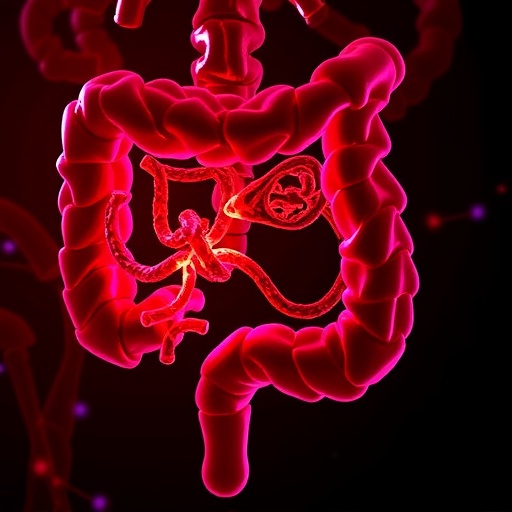In a groundbreaking discovery that could redefine therapeutic strategies for colorectal cancer, researchers have unveiled the pivotal role of PPA1 in stimulating oxidative phosphorylation and exacerbating malignant progression under glucose-restricted conditions. This innovative study, published in Cell Death Discovery on November 28, 2025, elucidates the molecular underpinnings by which colorectal cancer cells adapt to metabolic stress, specifically highlighting the AMPK/ULK1/FUNDC1-mediated mitophagy pathway as a critical axis controlled by PPA1.
Colorectal cancer remains one of the leading causes of cancer-related deaths worldwide, with metabolic reprogramming being a hallmark of tumor progression and survival. Cancer cells often rewire their bioenergetics to cope with fluctuating nutrient availability. The recent findings by Chen et al. underscore how colorectal cancer cells exploit mitophagy—a selective form of autophagy that eliminates damaged mitochondria—to sustain oxidative phosphorylation under glucose deprivation, thereby supporting tumor growth and resistance.
At the heart of this metabolic adaptation lies PPA1, a pyrophosphatase whose conventional role has been primarily linked to nucleotide metabolism. However, this new research expands our understanding, revealing that PPA1 actively promotes mitochondrial oxidative metabolism, especially when extracellular glucose levels plummet. By doing so, PPA1 mobilizes a survival mechanism that enhances mitochondrial quality control through mitophagy, effectively safeguarding cancer cells from metabolic crises.
The study delves deep into the cellular signaling cascade triggered by PPA1. Central to this mechanism is the activation of AMP-activated protein kinase (AMPK), a master regulator of cellular energy homeostasis. Under glucose-restricted conditions, PPA1 stimulates AMPK, which in turn phosphorylates ULK1, a critical initiator of the autophagy process. This phosphorylation event catalyzes the recruitment of FUNDC1, a mitochondrial receptor that orchestrates the selective removal of defective mitochondria, thus maintaining mitochondrial integrity and energy production.
This tightly controlled interplay between PPA1 and the AMPK/ULK1/FUNDC1 axis illustrates a sophisticated survival tactic cancer cells adopt, enabling them to thrive in otherwise hostile microenvironments. Mitophagy, far from being a mere cellular housekeeping function, emerges as a linchpin in the metabolic resilience and malignant progression of colorectal tumors. Such insights lay the groundwork for novel interventions targeting these adaptive pathways to cripple cancer cell metabolism.
Importantly, the research employed an array of cutting-edge techniques, including genetically engineered cell models and metabolic flux analyses, to dissect this complex biological network. Through these methods, the authors demonstrated that silencing PPA1 drastically reduces oxidative phosphorylation capacity and retards tumor growth in vitro and in vivo, underlining the therapeutic potential of targeting this enzyme.
The implications of these findings extend beyond colorectal cancer, opening questions about PPA1’s role in the metabolic plasticity of other cancers, especially those that commonly experience nutrient limitation within their microenvironment. Furthermore, this study recasts mitophagy from a passive cellular process into an active accomplice in cancer malignancy, suggesting that mitophagy modulators could serve as adjuncts to existing chemotherapy regimens.
Intriguingly, the team also discussed the potential feedback loops that may regulate PPA1 expression and activity, hinting at a broader regulatory network intertwining metabolic cues and oncogenic signaling. Deciphering these intricate feedback mechanisms could reveal additional therapeutic targets and biomarkers predictive of treatment response in colorectal cancer patients.
The metabolic vulnerabilities pinpointed in this research resonate with the current push towards precision oncology. By understanding how tumor cells orchestrate energy homeostasis and survival, clinicians may eventually tailor interventions that disrupt specific metabolic dependencies, potentially circumventing resistance pathways that have long hindered effective treatment.
Moreover, the study’s focus on glucose restriction mimics the tumor microenvironment more realistically than conventional high-glucose culture conditions, emphasizing the relevance of cellular context in cancer metabolism research. This aspect enhances the translational value of the findings, bringing lab observations closer to clinical realities.
This research also raises provocative considerations about diet and metabolism in cancer prognosis. The survival advantage conferred by PPA1 in glucose-depleted conditions suggests that nutrient availability and metabolic flexibility could influence tumor aggressiveness and patients’ responses to metabolic therapies.
As the molecular portrait of colorectal cancer metabolism becomes clearer, the notion of targeting mitophagy via the AMPK/ULK1/FUNDC1 pathway emerges as a promising strategy. However, further studies are necessary to elucidate potential side effects, given the essential role of mitophagy in normal tissue homeostasis, especially in highly metabolic organs.
In summary, the work of Chen and colleagues represents a significant stride in cancer biology, unveiling PPA1 as a nexus point linking energy metabolism, mitophagy, and tumor progression under metabolic stress. Its publication stands as a beacon for future research endeavors aiming to exploit metabolic vulnerabilities in cancer therapeutics, heralding a new era where targeting cellular energy management may unlock unprecedented clinical benefits.
This exciting breakthrough not only deepens our understanding of cancer biology but also catalyzes a paradigm shift towards targeting metabolic adaptability as a cornerstone of anticancer strategies. With metabolic reprogramming being an emerging hallmark of cancer, the identification of PPA1’s role opens a fertile ground for both basic and applied research that might soon translate into clinically viable interventions.
As the scientific community digests these pivotal findings, the hope is high that innovative drugs designed to inhibit PPA1 or disrupt the AMPK/ULK1/FUNDC1 mitophagy axis may one day form part of comprehensive treatment regimens, enhancing survival and quality of life for colorectal cancer patients facing this formidable disease.
Subject of Research: The role of PPA1 in promoting oxidative phosphorylation and malignant progression of colorectal cancer under glucose restriction via AMPK/ULK1/FUNDC1-mediated mitophagy.
Article Title: PPA1 promotes oxidative phosphorylation and malignant progression of colorectal cancer under glucose restriction via AMPK/ULK1/FUNDC1-mediated mitophagy.
Article References: Chen, Y., Deng, Q., Chen, Z. et al. PPA1 promotes oxidative phosphorylation and malignant progression of colorectal cancer under glucose restriction via AMPK/ULK1/FUNDC1-mediated mitophagy. Cell Death Discov. 11, 549 (2025). https://doi.org/10.1038/s41420-025-02816-y
Image Credits: AI Generated
DOI: 28 November 2025
Tags: AMPK ULK1 FUNDC1 pathwaycancer cell adaptation to nutrient stresscolorectal cancer therapeutic strategiesglucose restriction and cancer survivalmetabolic reprogramming in cancer cellsmetabolic stress response in tumorsmitochondrial quality control in cancermitophagy and cancer metabolismoxidative phosphorylation in tumor growthPPA1 role in colorectal cancerpyrophosphatase function in cancerselective autophagy in colorectal cancer





